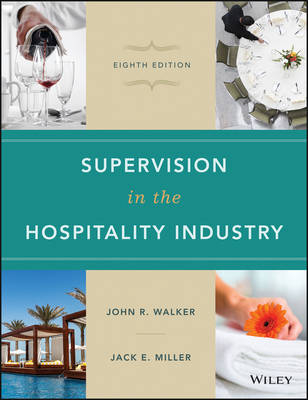
Supervision in the Hospitality Industry
John Wiley & Sons Inc (Verlag)
978-1-119-14846-3 (ISBN)
- Titel erscheint in neuer Auflage
- Artikel merken
John R. Walker, DBA, CHA, FMP, is a Fulbright Senior Specialist and the McKibbon Professor of Hotel and Restaurant Management at the School of Hotel and Restaurant Management at the University of South Florida, Sarasota-Manatee.
Preface ix
Chapter 1 The Supervisor as Manager 1
The Supervisor’s Role 2
Obligations and Responsibilities of a Supervisor/Executive Chef 3
Functions of Management 13
Theories of People Management 16
Managerial Skills 19
Tips for New Supervisors 23
Chapter 2 The Supervisor as Leader 29
Characteristics of Leaders 29
The Nature and Foundations of Leadership 31
Choosing a Leadership Style 33
Developing Your Own Style 40
Ethics 42
The Supervisor as Mentor 43
Chapter 3 Planning, Organizing, and Goal Setting 51
The Nature of Planning 52
Types of Plans and Planning 56
Planning for Change 63
Planning Your Own Time 69
Organizing for Success 74
Chapter 4 Communicating Effectively 79
The Importance of Good Communication 79
Why Communication is So Important 82
Obstacles to Good Communication 83
Listening 90
Directing People at Work 95
Business Writing 102
Meetings 103
Chapter 5 Equal Opportunity Laws and Diversity 107
Equal Opportunity in the Workplace 108
Equal Employment Opportunity Laws 109
EEO Laws and the Hiring Process 112
Equal Opportunity in the Workplace: What Leaders Need to Know 114
Diversity 114
Why Does Cultural Diversity Matter? 117
How to Increase Personal Awareness 118
How to Recognize and Practice Cross-Cultural Interaction 118
Leading Cultural Diversity in the Workplace 120
Establishing a Diversity and Inclusion Program 122
Managing Diversity Issues Positively 122
Chapter 6 Recruitment, Selection, and Orientation 127
The Labor Market 127
Determining Labor Needs 132
Recruiting 137
Selecting the Right Person 144
Negligent Hiring 154
Orientation 155
Chapter 7 Performance Effectiveness 161
Performance Improvement 161
Performance Standards 162
What a Good Performance Standard System Can Do 163
Setting Up a Performance Standard System 165
Implementing a Performance Standard System 173
Essentials of Performance Evaluation 175
Making the Evaluation 178
The Appraisal Interview 185
Follow‐Up 189
Legal Aspects of Performance Evaluation 189
Chapter 8 Motivation 195
Employee Expectations and Needs 195
Motivation 200
Theories of Motivation 202
Applying Theory to Reality: Limiting Factors 207
Building a Positive Work Climate 209
Focus: The Individual 210
Motivational Methods 212
Focus: The Job—Providing an Attractive Job Environment 217
Focus: The Leader 220
Chapter 9 Supervising Teams, Team Building, and Coaching 225
What is a Team? 225
Working Together 226
Building Teams 232
Installing Total Quality Management 236
Empowering Employees 239
Overcoming Team Challenges 240
Coaching 241
Chapter 10 Employee Training and Development 249
Importance of Training 249
Who Will Do the Training? 254
How Employees Learn Best 255
Developing a Job‐Training Program 257
Retraining 267
Overcoming Obstacles to Learning 268
Turnover and Retention 269
Chapter 11 Conflict Management, Resolution, and Prevention 275
What is Conflict? 275
Conflict Management 278
Conflict Resolution 281
Workplace Violence 284
Conflict Prevention 285
Chapter 12 Discipline 289
Essentials of Discipline 289
Approaches to Discipline 294
Administering Discipline 298
Termination 303
Employee Assistance Programs 310
Employee Safety 311
Harassment 312
The Supervisor’s Key Role 316
Chapter 13 Decision Making and Control 321
Decision Making 321
How to Make Good Decisions 324
Problem Solving 331
Building Decision-Making Skills 338
Controlling 339
Chapter 14 Delegating 347
What Delegation Means 347
Essentials of Delegation 348
Benefits of Delegation 350
Why People Resist Delegation 351
Why Some Employees Won’t Accept Responsibility 354
How to Delegate Successfully 354
Glossary 365
Index 375
| Erscheint lt. Verlag | 26.1.2018 |
|---|---|
| Verlagsort | New York |
| Sprache | englisch |
| Maße | 215 x 284 mm |
| Gewicht | 1118 g |
| Themenwelt | Technik ► Lebensmitteltechnologie |
| Wirtschaft ► Betriebswirtschaft / Management ► Personalwesen | |
| Weitere Fachgebiete ► Handwerk | |
| ISBN-10 | 1-119-14846-4 / 1119148464 |
| ISBN-13 | 978-1-119-14846-3 / 9781119148463 |
| Zustand | Neuware |
| Informationen gemäß Produktsicherheitsverordnung (GPSR) | |
| Haben Sie eine Frage zum Produkt? |
aus dem Bereich



